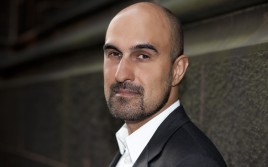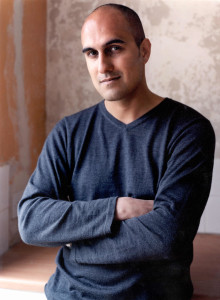Transcript
Introducing Hari Kunzru
Hari Kunzru is an award-winning British novelist famous for authoring several highly acclaimed novels, including The Impressionist (2002), Transmission (2004), My Revolutions (2007) and Gods Without Men (2011). Named among the twenty best young British novelists by Granta in 2003, Kunzru is also a PEN activist and 2014 Guggenheim Fellow. Since his debut novel’s publishing in 2002, he has cemented his role as one of Britain’s most acute observers and commentators on modern life and its intricacies.
“Transmission: A Conversation with Hari Kunzru”, was an event in honour of the author held at Birkbeck, University of London, in June 2014. In the Podcast, Kunzru answers questions about his work and there is additional insight and context provided by experts studying his work. There is also advice on ‘where to start with Kunzru’ for listeners wishing to learn more about the novelist.
A roller-coaster ride of surrealism, dystopia and satirical humour, Kunzru’s works come to life to both challenge preconceptions and shatter the boundaries of genre in contemporary British writing.
This podcast was produced and presented by Jo Barratt, with Isabella Grotto
Transcript
Jo Barratt: Welcome to Pod Academy. In this podcast we welcome the author Hari Kunzru, who came to read and answer some questions about his work at an event at Birkbeck university of London. The event was co-convened by Bianca Leggett, who explained her reasons for bringing this group of academics, writers and fans together to discuss Kunzru’s work.
Bianca Leggett: My work looks at British contemporary fiction and new cosmopolitan forms and tries to bridge those things together, which is something Hari’s work does. I have been very struck by the sense that Hari Kunzru’s work, by being so restless and inventive, really stretches over a great deal of expertise and scholars haven’t been brought together before and I was determined to make that happen, and I’m delighted it finally has.
JB: Before Bianca speaks to the author, we’re going to get an introduction from some of the attendees on the day. Dave Gunning is a lecturer in English literature at the University of Birmingham.
Dave Gunning: Hari Kunzru first really came into prominence in this country as one of the Granta best young British novelists in 2003 on the strength of his one published novel at that time and academics get worked up about to what extent he can be classed as a British novelist, given the global themes that are inside his work, but certainly they seem to identify the talent correctly. The Impressionist, which also won the Betty Trask prize, is the story of an Indian boy travelling around various identities in the early Twentieth century. It takes a sort of romp through the colonial era, but it’s also completely tied in to contemporary concerns about identity, what it means to be authentic, what it might mean to actually possess an identity, and throughout subsequent works we see this mix of an intellectually informed level of understanding of debates around culture, and particularly contemporary culture, tied to this wonderful storytelling sense. We see how the contemporary world is experienced and how people orientate themselves within that. In Transmission, the second novel in 2005, we get a computer virus bringing together the worlds of Bollywood cinema, brand management, fortress Europe, and the low status of Indian “tech” workers in the US. It’s a broad, intertwining and very funny book. In 2007, My Revolutions is more serious in tone and revisits the political activism of the 1960s in Britain. In 2011 he revisited this the network novel, his interconnected narratives, in Gods Without Men, with these broad marks of crossing historical periods, both finding a geographical base in the unearthly landscapes of the Mojave Desert. Last year, Kunzru’s story, Memory Palace formed the centre of an exhibition at the V&A in which a number of visual artists in different modes interpreted sections of this dystopic vision that tells the story of a world where to remember things is a crime. His recent work shows further interest in expanding the possibilities of the literary form, with the recent release of his digital tone poem Twice Upon A Time, which uses text, image, recorded street sound alongside the work of the composer Moondog to offer an immersive portrait of contemporary New York, but one which nonetheless resonates with the aural ghosts of an earlier incarnation of that city. Earlier this year, Kunzru was awarded an extremely prestigious Guggenheim fellowship, so we can hopefully continue to expect further stimuli and attention to the connections and conflicts that form some of our global space.
Pietra Palazzolo: My name is Pietra Palazzolo, I’m a doctor in modern and contemporary literature. I teach at Essex University and the Open University. My interest in Hari Kunzru’s work is in the way he subverts fixed categories of knowledge, both on a thematic level and on a formal level. Thematically, for example, he challenges multiculturalism, which is one of the categories that has been used in describing him, and he also challenges strategies of homogenisation of otherness. So what he does is interesting to me, because instead of attempting to represent ethnic authenticity, he invites us to go beyond the comfortable parameters of what is defined as ‘otherness’. He rejects the politics of assimilation, of cultural diversity, there is a play on current policy-making, but also in the recent emphasis in the media on national boundaries, ideas of Britishness and British values. Formally, what interests me in his work is the way that he invites us to participate in the creative resonances that his latest works especially highlight, for example Gods Without Men and his multi-modal essay “Twice Upon A Time”. I focus on his work for the way he combines his critique of fixed categories of knowledge with a particular emphasis on the way that literature is read and experienced.
Kristian Shaw: My name is Kristian Shaw, I’m doing an AHRC [Arts & Humanities Research Council] funded Ph.D. at Keele University. My research examines contemporary manifestations of Cosmopolitanism in contemporary 21st century British-American fiction, examining how ethical ideals are a necessity to face a culture of connectivity engendered by globalisation, transnationalism and digital communicative technology, and so I’m interested in how Hari Kunzru describes how these contemporary processes engender need to construct new analytical paradigms to perceive the interrelatedness of people and cultures around the world, and how the situation requires a cosmopolitan perspective to grasp the erosions of boundaries dividing people and life-worlds.
Dave Gunning: I think Hari Kunzru is one of the most interesting contemporary authors because of the way in which he is managing to capture the concerns of the moment, not just in the types of narratives he is telling, but in the ways he is using form and our relationship with types of storytelling in order to draw us into those stories of the contemporary world, a contemporary world which is shaped by what we can call globalisation, which has to do with the movements of people, it’s to do with the range and ubiquitousness of technology in the current age. For me, I am interested particularly in how his characters find places to belong within cultural formations, ways in which there is a negotiation of these difficult spaces, and what I find particularly interesting with Kunzru is the way in which he draws on some radical experimental traditions, these are characters finding places, he reminds us every now and again that these are characters and not people, he takes that step back from his work: his characters regularly vanish, I think in all of his major novels a character vanishes at some point, he takes those characters out, he makes us think again about how an author might go about constructing a suitable response to the 21st century. He’s not an obscure, difficult experimental writer, but when you read him you realise something is different at the same time as being able to connect with what are extremely gripping, and often very funny, stories.
Jo Barratt: Now we hear from Bianca again, this time in conversation with the author.
Additional listening – Kunzru reading from his work
This podcast is accompanied by a reading in which we hear from the author himself as he reads from two of his most iconic works: Gods Without Men (2011), Kunzru’s iconic novel on mixed-raced identity in India, and The Memory Palace (2013), a collaborative ‘walk-in’ book set in a post-digital London. Please see below for audio:
Tags: Birkbeck, Culture, identity, Kunzru, literature, Multiculturalism, Writing



Pingback: Hari Kunzru readings - Pod Academy